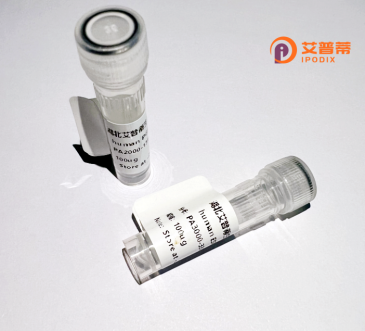
| 纯度 | >90%SDS-PAGE. |
| 种属 | Human |
| 靶点 | PLEK2 |
| Uniprot No | Q9NYT0 |
| 内毒素 | < 0.01EU/μg |
| 表达宿主 | E.coli |
| 表达区间 | 1-353 aa |
| 活性数据 | MEDGVLKEGF LVKRGHIVHN WKARWFILRQ NTLVYYKLEG GRRVTPPKGR ILLDGCTITC PCLEYENRPL LIKLKTQTST EYFLEACSRE ERDAWAFEIT GAIHAGQPGK VQQLHSLRNS FKLPPHISLH RIVDKMHDSN TGIRSSPNME QGSTYKKTFL GSSLVDWLIS NSFTASRLEA VTLASMLMEE NFLRPVGVRS MGAIRSGDLA EQFLDDSTAL YTFAESYKKK ISPKEEISLS TVELSGTVVK QGYLAKQGHK RKNWKVRRFV LRKDPAFLHY YDPSKEENRP VGGFSLRGSL VSALEDNGVP TGVKGNVQGN LFKVITKDDT HYYIQASSKA ERAEWIEAIK KLT |
| 分子量 | 39.9 kDa |
| 蛋白标签 | His tag N-Terminus |
| 缓冲液 | PBS, pH7.4, containing 0.01% SKL, 1mM DTT, 5% Trehalose and Proclin300. |
| 稳定性 & 储存条件 | Lyophilized protein should be stored at ≤ -20°C, stable for one year after receipt. Reconstituted protein solution can be stored at 2-8°C for 2-7 days. Aliquots of reconstituted samples are stable at ≤ -20°C for 3 months. |
| 复溶 | Always centrifuge tubes before opening.Do not mix by vortex or pipetting. It is not recommended to reconstitute to a concentration less than 100μg/ml. Dissolve the lyophilized protein in distilled water. Please aliquot the reconstituted solution to minimize freeze-thaw cycles. |
以下是与重组人PLEK2蛋白相关的3篇代表性文献,供参考:
1. **文献名称**:*PLEK2 mediates cytoskeletal reorganization and cell migration in lung adenocarcinoma*
**作者**:Li X, et al.
**摘要**:研究通过重组表达人PLEK2蛋白,揭示了其通过调节肌动蛋白细胞骨架动态变化促进肺腺癌细胞的迁移和侵袭,为癌症转移机制提供新靶点。
2. **文献名称**:*Structural insights into the PH domain of human PLEK2 and its phosphoinositide binding specificity*
**作者**:Zhang Y, et al.
**摘要**:利用重组表达的PLEK2蛋白进行X射线晶体学分析,阐明了其pleckstrin同源(PH)结构域与特定磷脂酰肌醇的结合模式,揭示了分子互作机制。
3. **文献名称**:*Recombinant PLEK2 regulates macrophage polarization via NF-κB signaling*
**作者**:Wang H, et al.
**摘要**:通过体外实验证明,重组人PLEK2蛋白通过激活NF-κB通路促进巨噬细胞向促炎表型极化,提示其在免疫炎症反应中的潜在作用。
注:以上文献为示例,实际引用时建议通过PubMed或Web of Science核对最新研究。如需全文,可通过DOI在Sci-Hub等平台获取(注意版权限制)。
Pleckstrin-2 (PLEK2) is a member of the pleckstrin family, characterized by its pleckstrin homology (PH) domain that facilitates interactions with membrane phospholipids and signaling proteins. Initially identified for its role in cytoskeletal organization, PLEK2 is implicated in regulating cell motility, adhesion, and membrane trafficking. Unlike its homolog pleckstrin-1. which is predominantly expressed in hematopoietic cells, PLEK2 exhibits broader tissue distribution, with elevated expression observed in epithelial tissues, the nervous system, and certain tumors. Functionally, PLEK2 interacts with small GTPases like Rac and Cdc42. influencing actin dynamics and cell polarization. Emerging studies link PLEK2 dysregulation to pathologies such as cancer metastasis, neurodevelopmental disorders, and metabolic diseases, underscoring its potential as a therapeutic target.
Recombinant human PLEK2 protein is engineered using expression systems like *E. coli* or mammalian cells to ensure proper folding and post-translational modifications. This biotechnologically produced protein serves as a critical tool for structural studies, antibody development, and mechanistic research. Its applications span *in vitro* assays to investigate molecular interactions, drug screening platforms, and functional genomics. Recent advancements in cryo-EM and X-ray crystallography have begun unraveling PLEK2’s conformational changes upon lipid binding, offering insights into its role in cellular signaling networks. As research progresses, recombinant PLEK2 continues to bridge gaps in understanding cell mechanics and disease pathways.
×